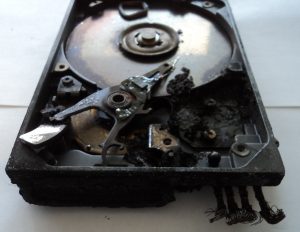
A hard drive badly burnt in a house fire.
Hard drive shipments have fallen in recent years, and somewhat dramatically: By one estimate, the total number of shipped hard drives dropped by 33.5% from the first quarter of 2022 to the first quarter of 2023.
For modern consumers, solid-state drives (SSDs) are simply a better option. While SSD costs much more on a per-gigabyte basis, most people don’t need a tremendous amount of storage — and SSD is much faster than traditional HDD technology. It’s also more resistant to some (but not all) media failure scenarios.
That prompts an interesting question: Will hard drives ever become obsolete?
Personal computer users will continue migrating to SSD.
The market for solid-state storage continues to grow, and major players are propelling it forward. In July 2022, Microsoft began pushing manufacturers to drop HDDs as boot devices to ensure consistent performance across the different types of machines that run Windows 11.
The policy is reasonable, given the performance differences between SSD and HDD technology. Standard SSDs can maintain sequential read/write speeds of 540/520 megabytes per second (MB/s), respectively; NVMe SSDs can push that number to 3,400/2,800 MB/s.
For comparison, the fastest consumer hard drives reach read speeds of about 554 MB/s. And since hard drives rely on mechanical components, their speed is limited by the physics of those components; solid-state media has a different set of limitations.
Currently, hard drives have one important advantage over SSD: They cost much less per-gigabyte, which makes them a superior option for serious data storage. But solid-state storage has become much less expensive in recent years, and the trend will likely continue (although you still shouldn’t trust those 2-terabyte flash drives you see on Amazon for $40).
Given those factors, it’s quite likely that hard drives will become functionally obsolete for personal use. One storage industry executive expects this to occur by 2028 — but we’re less certain.
For data centers, hard drives will remain essential.
While your home computer may not have an HDD — and you may not have any plans to change that in the near or distant future — hard drives are still a vital part of your computing experience.
Why? The cloud (or, more specifically, the data centers that power the cloud).
At the enterprise level, the low price point of HDD storage is simply too good to pass up. The performance bottlenecks of traditional HDD storage can be surpassed by configuring drives into arrays, which also establishes redundancy — a single hard drive failure will not usually cause permanent data loss (though array failures can certainly occur).
And manufacturers are still introducing new technologies to make hard drives faster, more reliable, and less expensive. In March, cloud storage provider Dropbox announced plans to use hard drives featuring heat-assisted magnetic recording (HAMR) in its data centers.
Other technologies include Shingled Magnetic Recording (SMR), which increases areal density by overlapping the magnetic tracks that store data.
These new technologies cost a lot of money to develop; if hard drives were about to disappear, manufacturers wouldn’t keep investing in new tech.
We’re storing more data than ever before, and most of that data is on hard drives.
By one estimate, global data creation will grow to more than 180 zettabytes by 2025. A zettabyte is equal to a trillion gigabytes, and all of those files need somewhere to live.
While SSDs may force the obsolescence of consumer hard drives, that’s simply not the case at the enterprise level. Data centers need cost-effective storage, and hard drives simply provide the best (and most affordable) solution.
At Datarecovery.com, we love solid-state storage; if we were forced to use hard drives for 100% of our operations, we’d have trouble maintaining our industry-leading success rates and turnaround times. However, on a global scale, hard drives still have an important role to play — and that’s not changing anytime soon.
For professional data recovery, data tape migration, computer forensics, and other services, call 1-800-237-4200 to speak with an expert or schedule a free evaluation online.





